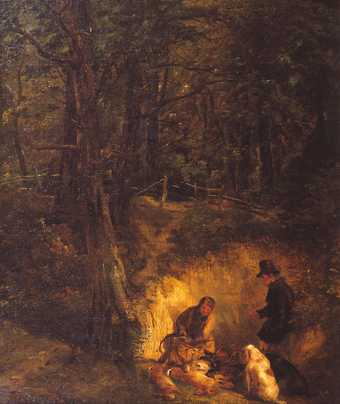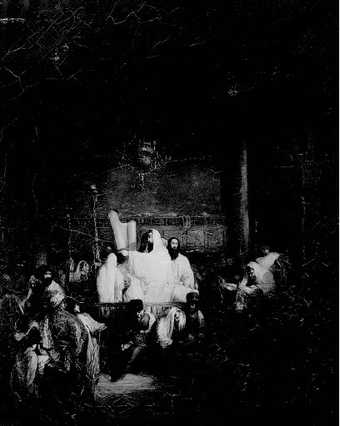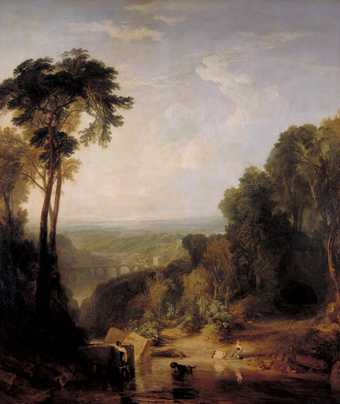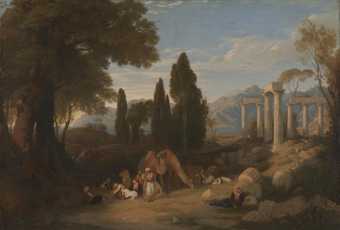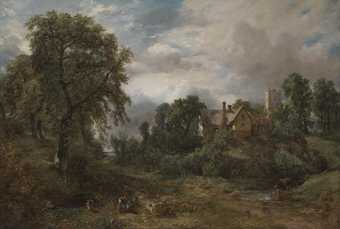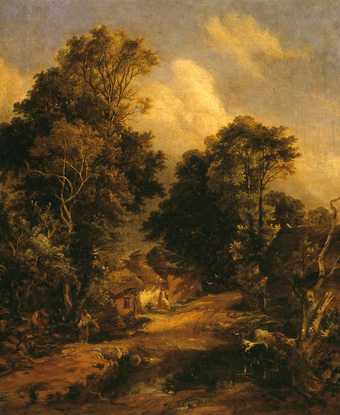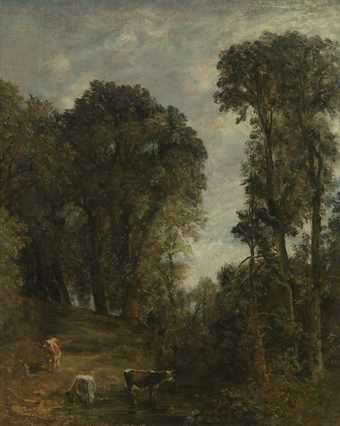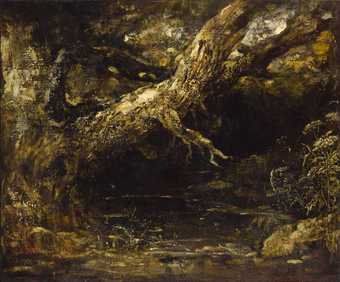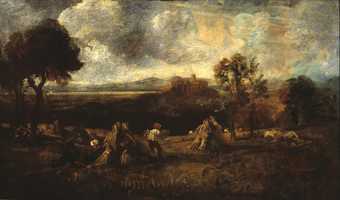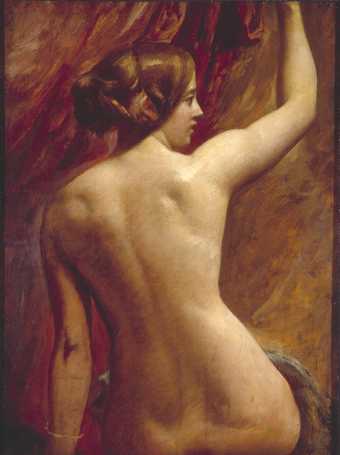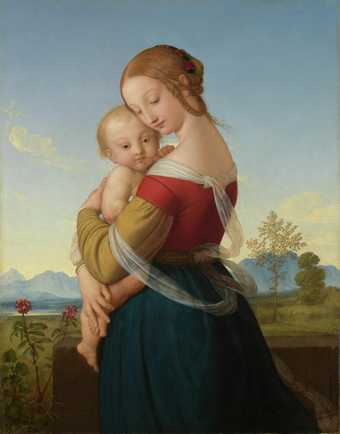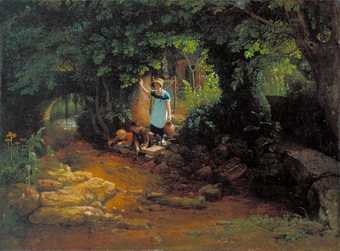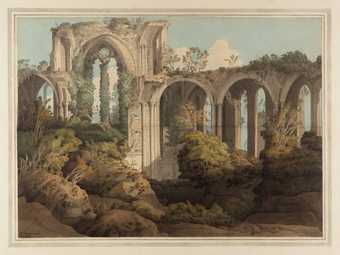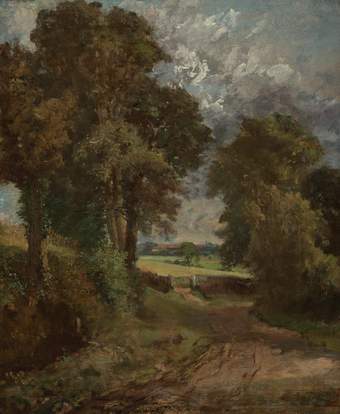
Not on display
- Artist
- John White Abbott 1763–1851
- Medium
- Oil paint on canvas
- Dimensions
- Frame: 1000 × 800 × 85 mm
- Collection
- Tate
- Acquisition
- Presented by Richard Stephens in memory of his father, Brian Thomas Stephens, 2017
- Reference
- T14834
Summary
This small oil painting shows a secluded woodland scene not far from Exeter in Devon, in the south west of England. The scene is deliberately dark, evoking the example of the celebrated seventeenth-century Dutch landscape painter Jacob van Ruisdael (1628/9?–1682). As in Ruisdael’s paintings, the scene appears unassuming and commonplace; visual interest is created by intricate and twisting natural forms and the subtle play of light, with sunlight breaking through a narrow gap in the trees to illuminate the fallen tree trunk and glittering stream below.
The painting is characteristic of John White Abbott’s later work. He spent his working life in Exeter in Devon, where he was an apothecary (dispensing chemist) and surgeon, but took a keen amateur interest in art. He took lessons from the innovative Exeter-based landscape painter Francis Towne (1739–1816), probably since childhood, and absorbed his teacher’s style and approach to art, becoming one of his most celebrated pupils. Although he always lived in Devon, White Abbott exhibited at the Royal Academy in London from 1793–1805, as well as in 1810 and 1822, gaining a reputation as an artist. His oil paintings are scarcer than his works on paper, although as the scholar Paul Oppé noted, ‘It was as a painter in oils that White Abbott gained his contemporary reputation.’ (Oppé 1924–5, p.70.) An art manual of 1821 placed ‘the tasteful landscapes of Mr Abbott, of Exeter’ in a tradition of landscape painters including Claude Lorraine, Ruisdael, Thomas Gainsborough and Richard Wilson, all of whom painted ‘as much as possible with thin and transparent colours’ particularly in ‘the painting of the trees, and, above all, to such parts of them as come against a light part of the sky, or as shew the effect of light, passing through the foliage.’ (W.M. Craig, A Course of Lectures on Drawing, Painting, and Engraving, London 1821, p.275).
In 1825, at the age of sixty-two, White Abbott inherited property at Fordland in Devon, and retired there to live the life of a country gentleman. This painting is one of a series of drawings and oil paintings showing the scenery of Fordland produced during this rural retirement, many featuring dark woodland and dominated by long and twisting tree trunks as seen here. Although this work is not dated, it bears the artist’s monogram, ‘JWA’, at the bottom edge in the centre, a device which he used from the 1820s. Dated examples of his Fordland scenes range from 1826–42, so the painting seems likely to have been executed within that period.
Further reading
A.P. Oppé, ‘John White Abbott of Exeter (1763–1851)’, The Walpole Society, vol.13, 1924–5, pp.67–84.
Richard Stephens, ‘John White Abbott’, in A Catalogue Raisonné of Francis Towne (1739–1816), London 2016, http://dx.doi.org/10.17658/towne/s5e2, accessed December 2016.
Martin Myrone
December 2016
Does this text contain inaccurate information or language that you feel we should improve or change? We would like to hear from you.
Explore
- places(26,467)
-
- UK cities, towns and villages(12,725)
-
- Fordland(1)
- UK counties(19,585)
-
- Devon(648)
- UK countries and regions(24,355)
-
- England(19,202)
You might like
-
Sir Charles Lock Eastlake Haidée, a Greek Girl
1827, exhibited 1831 -
Frederick Richard Lee, Sir Edwin Henry Landseer Cover Side (figures and animals by Sir E. Landseer)
1839, ?exhibited 1840 -
Solomon Alexander Hart Interior of a Polish Synagogue at the Moment when the Manuscript of the Law is Elevated
1829–30, exhibited 1830 -
Joseph Mallord William Turner Crossing the Brook
exhibited 1815 -
Sir Charles Lock Eastlake Lord Byron’s ‘Dream’
1827, exhibited 1829 -
John Constable The Glebe Farm
c.1830 -
George Burrell Willcock Chelston Lane, Torquay
1851 -
John Constable Trees at Hampstead
1829 -
Formerly attributed to John Constable Trunk and Lower Branches of a Tree
date not known -
Peter De Wint Harvesting
date not known -
Edward Calvert Nude Study
c.1830–50 -
William Dyce Madonna and Child
c.1827–30 -
Francis Danby Children by a Brook
c.1822 -
Francis Towne Netley Abbey
1809 -
John Constable A Cornfield
?1817


